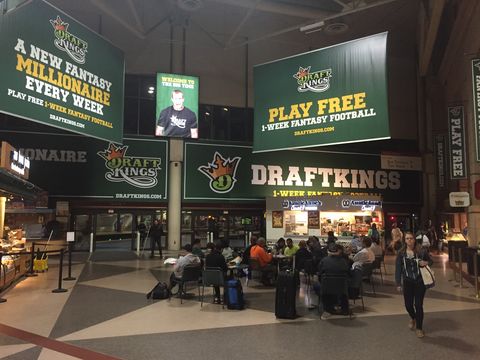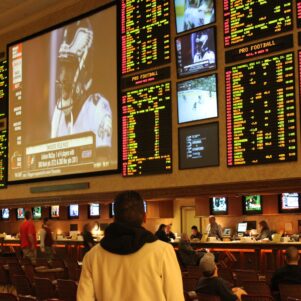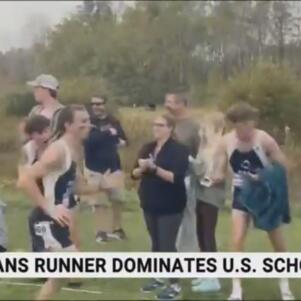Lottery steps toward entering fantasy sports market
By State House News Service | November 2, 2015, 19:22 EST
 (File photo by State House News Service)
(File photo by State House News Service) BOSTON – Framing it as innovation that could open up a new revenue source and attract younger customers, the Massachusetts Lottery Commission took the first step Monday towards developing a state-run daily fantasy sports game.
“We believe the introduction of a fantasy sports platform at Mass. Lottery would help to embrace an emerging market while continuing to protect our retail partners,” Lottery Executive Director Michael Sweeney said. “This particular type of game would not cannibalize our existing products, it would obviously be a new product, it would help us to engage what we would refer to as a ‘next-generation’ player and hopefully it would also help Lottery to create a new revenue source as opposed to eroding or maintaining existing offers.”
Sweeney said the daily fantasy sports industry is “the biggest challenge” facing the Lottery, citing the industry’s use of technology, its appeal to younger people and the ease of partaking in games.
Sweeney told the Lottery Commission that the next step is to gather information to better understand the emerging industry and its market.
Treasurer Deborah Goldberg, who about a month ago said it was time the Lottery began working on developing a state-run fantasy sports website, said she believes there is a way to introduce such games without harming the roughly 7,500 small businesses that rely on commissions from Lottery ticket sales and Lottery-based foot traffic.
“As we look at what slice of this we might be able to consider, I think one of the things we have to do is tie in our retailers to whatever it is we end up doing,” the treasurer said. “We also are a very important driver of foot traffic to small retailers who are a middle-class, very often immigrant groups, and families throughout the state.”
Responding to the rapidly growing daily fantasy sports market this year, Goldberg has softened her opposition to online gaming to allow for a possible Lottery-run fantasy sports game, though she said Monday she remains opposed to any effort to allow the Lottery to sell its current offerings online.
Asked in September if she would be open to a Lottery-operated online gaming program, Goldberg told the News Service, “it’s very premature to even be considering that” and said her focus is on maximizing the Lottery’s profits and getting that money to cities and towns across the state.
About two weeks later, Goldberg announced that her office was “currently having discussions on how to offer this new format in a venue that protects the consumer and preserves fundamental fairness within the game.”
On Monday, Goldberg framed daily fantasy sports as an opportunity for innovation at the Lottery and compared it to the introduction of Keno, which she said was a controversial decision at the time.
“The last innovation we did at the Lottery was in 1993, which was Keno … and prior to that we were the first lottery to develop the scratch ticket, which was 40 years ago,” Goldberg said. “So we have been very lucky to have been leading and the two things that generate more than 87 percent of our revenue and profit are Keno and the scratch ticket.”
Sweeney told members of the Lottery Commission that without innovative products, the Lottery’s players “are skewing toward an older demographic” and the Lottery is missing out on opportunities for greater growth.
“I don’t think that it is necessarily a coincidence that Lottery has not had what I would call a truly innovative product since 1993 and what we’re seeing is a demographic shift from our buying public,” Sweeney said. “I don’t know too many businesses that can be successful not having new product and new innovation … for robust growth, we need to explore some new ground.”
State Comptroller Thomas Shack, who is a member of the Lottery Commission, said daily fantasy sports sites are “a disruptive technology, just like Uber” and predicted that such products will only grow with the “gameification” of society.
“As the next generation is growing up with iPhones and iPads in their hands at less than a year old, that gameification process is only going to grow,” he said. “We have to have that concept of, you know, are we going to be in the buggy whip business or are we going to be in the accelerator business from a Lottery standpoint?”
As the Lottery Commission moves forward on developing its own fantasy sports offering, Beacon Hill leaders in recent weeks have seemed to signal that the question is no longer if the state will impose regulations, but rather what form those regulations will take.
House Speaker Robert DeLeo has said fantasy sports is “going to have to be something that does set forth some regulations” and Attorney General Maura Healey said the industry is one that “cries out for a regulatory legal framework and structure,” as her office continues its review of websites like DraftKings and FanDuel.
Senate President Stanley Rosenberg has previously called for the industry to be regulated and taxed, and Gaming Commission Chairman Stephen Crosby has urged caution in regulation and said his commission needs to be “mindful of the fact that if we came in heavy on this, we could crush an industry like this overnight.”
Goldberg and Sweeney said Monday that it is far too early to say what a potential Lottery-run fantasy sports game would look like, noting that the regulatory environment will likely be different by the time any possible game is implemented.
Written by Colin A. Young











